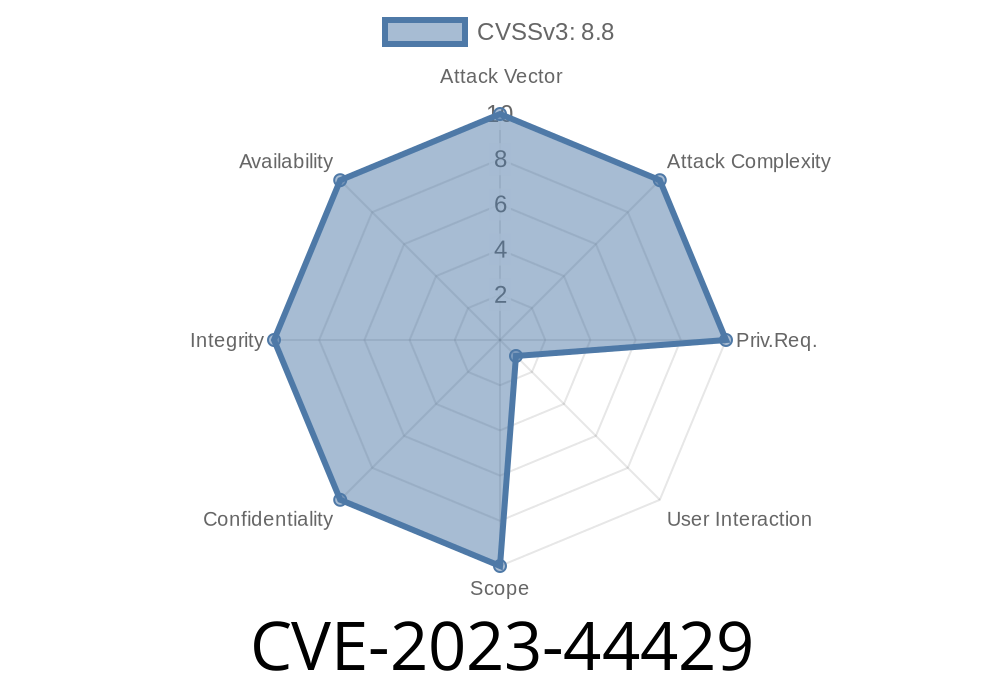---
GStreamer is one of the most widely used media frameworks for processing audio and video files. It's leveraged across Linux desktops, smart TVs, embedded systems, and even in some web browsers. But in October 2023, a critical security vulnerability was discovered in how GStreamer handles AV1 encoded video files: CVE-2023-44429.
In this long-read post, we'll break down what CVE-2023-44429 is, how it can be exploited, with easy-to-understand code snippets, and offer guidance on protecting affected systems.
What is CVE-2023-44429?
This vulnerability is a heap-based buffer overflow in the AV1 parsing code of the GStreamer multimedia library. It arises when GStreamer processes a specially crafted AV1 video file without sufficient validation of the input data's length. By exploiting this bug, an attacker can potentially run arbitrary code on any system that plays or processes such a file, _in the context of the user’s process_.
Attack vector: The flaw requires that an affected system or application _processes attacker-supplied AV1 files_ with GStreamer. This could be as simple as a user opening a malicious video in a media player, a browser, or even apps and IoT devices using GStreamer under the hood.
References
- ZDI Advisory – ZDI-CAN-22226
- CVE details at NIST
- GStreamer Official Site
Where’s the Bug?
At the heart of this vulnerability is missing or incorrect bounds checking when copying user-controlled data into a heap buffer during AV1 bitstream parsing.
Here’s a simplified sketch of the offending code logic (note: real GStreamer code is much larger and complex):
void parse_av1_obu(uint8_t* input, size_t input_len) {
uint8_t header[32];
size_t header_len = extract_obu_header_length(input, input_len);
// Missing check: header_len should never be more than sizeof(header)
memcpy(header, input, header_len);
// ... further processing ...
}
If header_len is larger than 32 (sizeof(header)), then memcpy will overrun the allocated buffer. This allows an attacker to overwrite adjacent heap memory—which can be used to hijack control flow and execute their own code.
Exploiting the Overflow
An attacker crafts a malicious .av1 video file where the embedded length field for an OBU (Open Bitstream Unit) header is much larger than it should be. When GStreamer processes this file, it copies too much data into a small buffer, corrupting critical structures on the heap.
If the attacker controls enough of the heap layout (possible in media parsing scenarios), they can steer execution to attacker-supplied shellcode, gaining code execution on the device.
Sample malicious AV1 chunk (hexdump)
00 44 32 00 ... FF FF FF FF FF FF FF FF // Malicious OBU header with large length field
For context, a proof-of-concept exploit could look like (note: this is conceptual and for educational purposes):
# Make a malicious AV1 file that causes heap overwrite when parsed
with open("evil.av1", "wb") as f:
f.write(b'\x00') # Mock OBU type
f.write(b'\xFF') # Malicious huge length
f.write(b'A' * 100) # Overflow bytes
# ...fill with further crafted data as needed...
When a vulnerable app opens evil.av1, arbitrary code execution could occur if the heap can be manipulated.
Impact
- Remote code execution: The attacker gains the ability to run code as the user who played the video.
- Widespread attack surface: Any device, app, or system parsing untrusted video with GStreamer’s AV1 codec is at risk.
- Multiple attack vectors: This could include: browsers (WebKit), desktop media players (Totem, VLC if built with GStreamer), chat applications, IoT cameras, and more.
- Potential for wormable attacks: If auto-processing is enabled (such as in file previews, thumbnails), the impact could be significant.
AV1 video codec support is enabled (libgav1, gst-plugin-av1).
- Your installed versions are before the patched release (see GStreamer advisories for fixed versions).
Check your version
gst-inspect-1. --version
Update your GStreamer libraries and AV1 plugins! Official patches have been issued.
- GStreamer Security Advisories
- If you can’t update, disable AV1 support as a temporary workaround by removing or renaming the AV1 plugin/library files.
Real-World Scenarios
1. Malicious email/video attachment: Opening a hacked AV1 video in a chat or mail app triggers the exploit.
2. Poisoned web content: Website embeds a hostile AV1 clip, leveraging in-browser GStreamer pipelines.
3. Compromised IoT devices: A media monitoring device processes a rogue AV1 stream and is taken over.
Keep all multimedia libraries updated, not just your apps.
- Sysadmins: patch servers, workstations, and all endpoints, especially where GStreamer is embedded.
Conclusion
CVE-2023-44429 is a serious vulnerability because it turns simple media parsing into a code execution opportunity for attackers, by exploiting an overlooked heap overflow bug in AV1 parsing routines. It's a textbook example of how a single missing bounds check can put millions of systems at risk.
More Reading
- ZDI-CAN-22226 Advisory
- Official GStreamer Security
- MITRE CVE-2023-44429
Stay safe, patch often, and always treat untrusted media with caution.
Timeline
Published on: 05/03/2024 03:15:57 UTC
Last modified on: 06/04/2024 17:19:26 UTC
